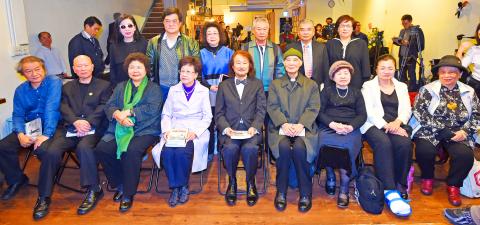Remembering the past while looking forward to the future, about a dozen former democracy activists gathered in Taipei yesterday to commemorate the 35th anniversary of the Formosa Incident, saying that they are optimistic about the future of Taiwan’s democracy because of recent pro-democracy movements.
The Formosa Incident, also known as the Kaohsiung Incident, involved an anti-government demonstration organized by Formosa Magazine on Dec. 10, 1979. Intended as a march in honor of International Human Rights Day, the event turned violent when members of the crowd unknown to the organizers — and widely believed to have been agents provocateurs — began attacking police. The Chinese Nationalist Party (KMT) government court-martialed and jailed eight activists, who became known as the Kaohsiung Eight.
Speaking at an event in Taipei to commemorate the Incident, and to launch a book on it, former Democratic Progressive Party (DPP) chairman Hsu Hsin-liang (許信良) said that while it is still hard to foresee the outcome of the social movements — including the Sunflower movement, the demonstrations for human rights in military and several other movements for environmental or development issues — he is certain that they will bring about positive reforms to Taiwan’s democracy.

Photo: Liu Hsin-de, Taipei Times
“Most of what we pursued in the pro-democracy movements in the 1970s — such as direct election of the president — came to pass in the 1990s, so I’m sure that the problems facing this generation and which led to the recent social movements will be solved in a few decades, even though we may not foresee what will happen in the end,” Hsu told the audience.
“Issues facing Taiwan today — such as unequal distribution of wealth, cross-strait relations, and economic recession — exist because government leaders in the past two decades never thought about these issues, and therefore it’s natural that the civil society would want reforms,” Hsu said. “I’m optimistic that Taiwan’s democracy will deepen, and we should develop a Western European style of democracy.”
One of the Kaohsiung Eight — Shih Ming-te (施明德), lashed out against President Ma Ying-jeou’s (馬英九) leadership, saying that under Ma, the nation has lost its direction, and that Ma does not know how to handle cross-strait relations well, deals with the economy poorly and actively develops excessively close ties with large corporations.
Former vice president Annette Lu (呂秀蓮), who was another of the eight, thanked the public for remembering the pro-democracy activists of the past.
“I feel honored that we are still remembered,” Lu said. “The meaning behind remembering the Formosa Incident today is to pass on the value that we should always try to light up the world when it’s dark, and we should make it a value instilled in every Taiwanese.”
“No matter how we look forward to the future, we shall remember the past, for those without a sense of history cannot create the future,” she added.

Alain Robert, known as the "French Spider-Man," praised Alex Honnold as exceptionally well-prepared after the US climber completed a free solo ascent of Taipei 101 yesterday. Robert said Honnold's ascent of the 508m-tall skyscraper in just more than one-and-a-half hours without using safety ropes or equipment was a remarkable achievement. "This is my life," he said in an interview conducted in French, adding that he liked the feeling of being "on the edge of danger." The 63-year-old Frenchman climbed Taipei 101 using ropes in December 2004, taking about four hours to reach the top. On a one-to-10 scale of difficulty, Robert said Taipei 101

Nipah virus infection is to be officially listed as a category 5 notifiable infectious disease in Taiwan in March, while clinical treatment guidelines are being formulated, the Centers for Disease Control (CDC) said yesterday. With Nipah infections being reported in other countries and considering its relatively high fatality rate, the centers on Jan. 16 announced that it would be listed as a notifiable infectious disease to bolster the nation’s systematic early warning system and increase public awareness, the CDC said. Bangladesh reported four fatal cases last year in separate districts, with three linked to raw date palm sap consumption, CDC Epidemic Intelligence

Two Taiwanese prosecutors were questioned by Chinese security personnel at their hotel during a trip to China’s Henan Province this month, the Mainland Affairs Council (MAC) said yesterday. The officers had personal information on the prosecutors, including “when they were assigned to their posts, their work locations and job titles,” MAC Deputy Minister and spokesman Liang Wen-chieh (梁文傑) said. On top of asking about their agencies and positions, the officers also questioned the prosecutors about the Cross-Strait Joint Crime-Fighting and Judicial Mutual Assistance Agreement, a pact that serves as the framework for Taiwan-China cooperation on combating crime and providing judicial assistance, Liang

US climber Alex Honnold left Taiwan this morning a day after completing a free-solo ascent of Taipei 101, a feat that drew cheers from onlookers and gained widespread international attention. Honnold yesterday scaled the 101-story skyscraper without a rope or safety harness. The climb — the highest urban free-solo ascent ever attempted — took just more than 90 minutes and was streamed live on Netflix. It was covered by major international news outlets including CNN, the New York Times, the Guardian and the Wall Street Journal. As Honnold prepared to leave Taiwan today, he attracted a crowd when he and his wife, Sanni,